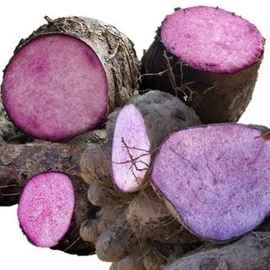
support@yorubalibrary.com
+2348073529208, 07038599574

The Yoruba people have a special regards for yam, so much so that it even has its own festival, popularly known as "New Yam Festival" (Ijesu or Odun Isu). This festival celebrate the harvest and the bounty of the land. This reverence stems not only from its nutritional value but also from its versatility in our culinary traditions. Let's explore some of the prominent varieties: 
1. Igangan:
Special Characteristics: Igangan is often recognized by its elongated shape and relatively smooth, yellow skin. The flesh is typically firm, with a slightly watery texture compared to some other varieties. It's known for its ability to absorb flavors well.
Yoruba Delicacies:
Due to its texture, Igangan is particularly well-suited for dishes where it needs to soak up sauces. A classic example is porridge.
2. Isu'ko (or Ako Isu):
Special Characteristics: Isu'ko, also known as Ako Isu, is quite distinct. Ako Isu is perhaps one of the most common and versatile yams in Yoruba land. It has a relatively smooth, brown skin and firm, white flesh that cooks up to a fluffy texture. It's known for its mild, slightly sweet flavor.
Yoruba Delicacies:
Isu'ko's unique texture makes it ideal for Isu sisun (roasted yam) and pounded yam (Iyan). For Isu Sisun, the roasting process brings out a slightly sweet flavor and a pleasant chewiness. It's often enjoyed with a spicy palm oil sauce (ata dindin) or simply with peppered stew.
3. Ewura (Water Yam):
Special Characteristics: Ewura often has a rough, hairy exterior and a somewhat slimy texture when peeled. Its flesh is usually whitish and can be a bit sticky.
Yoruba Delicacies:
Ewura is mostly used for "Ojojo" in some parts of Yoruba land.
4. Igudugudu (Poisonous Yam):
Special Characteristics: Igudugudu is easily identifiable by its flesh. It often comes in bulb shape and this type of yam is not edible.
5. Esuru:
Special Characteristics: Esuru stands out due to its distinctly bitter taste when raw. It typically has a rough, dark brown skin and a firm, whitish flesh. It requires careful preparation when being cooked, and this varieties stay longer on fire during cooking before it will be ready for consumption than other yam varieties.
6. Dagi-Dagi (also called Tanpa Tanpa):
Special Characteristics: While technically belonging to a different genus (Dioscorea alata), Dagi-Dagi is a cherished tuber in Yoruba land. When harvested, it is often enormous. It has a slightly sweet and nutty flavor and a softer texture compared to some other yams.
LIST OF YORUBA PROVERBS ASSOCIATED WITH YAMS
1) Ojú iná ko´ lewùrà nhurun.
It is not in the presence of the flame that water-yam grows hair.
(One dares not strut when one's bane is around.)
2) Oníbàjé ò mora; oníbàjé nlo sóko olè ó mú obìnrin lo; Oko´ kó akosu, ìyàwó kó ewùrà.
The shameless person does not know what is fitting; the shameless person is off to raid a farm, and he takes his wife along; the husband steals staple yams, the wife steals water-yams.
(A man who involves his family in his questionable ventures has sunk to the lowest depths.)
3) Bí a bá kìlo fólè, ká kìlo fónísu èbá onà.
As one warns the thief, one should also warn the owner of the wayside yams.
(The offender and the tempter both deserve blame.)
4) Bí a kò bá torí isu je epo, à torí epo je isu.
If one does not eat oil because of yams, one will eat yams because of oil.
(We sometimes do things not necessarily because of value attached but to fulfill all righteousness)
5) “Bùn mi nísu kan” kì í sáájú “Ekú oko òo.”
“Give me one yam” does not precede “Greetings to you on the farm.”
(One does not ask a favor of, or transact any business with any person without first exchanging pleasantries with the person.)
If you know any other proverb associating with yam, you can comment it below.